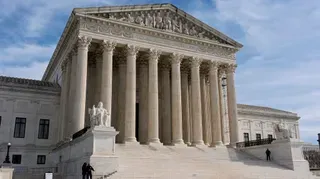December 10, 2008
LGBTs and the new Anglican church
Michael Wood READ TIME: 4 MIN.
The Anglican Communion has seen several rifts in the past few years, with members divided over issues like the ordaining of women and openly gay priests. On Dec. 3, members of the Episcopal Church (the American branch of Anglicanism) met at Wheaton Evangelical Free Church in Wheaton, Ill., and unveiled a draft constitution for a newly formed Anglican Church in North America. It will be headed by Bishop Robert Duncan of Pittsburgh.
The Anglican Church's spiritual leader is the archbishop of Canterbury, a post currently held by Rowan Williams. The Archbishop came under fire from conservatives for a statement in August that gay relationships "were comparable to marriage." Until now, Episcopalians who disagreed with their church hierarchy over such issues could defer to the authority of African and Latin American bishops. This further bolsters the idea that communities of the faithful in those areas are particularly prone to be far more socially conservative on issues related to gender and homosexuality.
According to Robert Lundy, a spokesperson for the new Anglican Church in North America, "what we have from these leaders in Africa is spiritual leadership. The leadership was not practicing traditional and faithful Christianity. These leaders from other countries give us guidance. We're teaching nothing that hasn't been taught for 2,000 years. We want the world to conform to the Bible, not the Bible to the world."
Rev. Deborah Lake of Sankofa Way-a nonprofit, faith-based organization that focuses on gays and lesbians-pointed out that religion is deeply connected to economic need in developing countries facing immense poverty: "People there don't just go to church for services, when the church, in places of deep poverty, is the only place that provides the basics of life. People need what you're giving them. if you give them a loaf of bread, people will follow you."
With regard to the issue of social conservatism, Lake sees it as more than the case that people in Africa and Latin America are inherently homophobic. "The problem is that there is no other message [regarding homosexuality]," she said. "Our job, as leaders in the LGBT community and as people of faith, is not to change people's minds but to demonstrate the effects of homophobia." She pointed to examples in Jamaica where gays and lesbians are getting killed in the streets, and emphasized the importance of solidarity between LGBT people of color in the United States and their colleagues elsewhere.
Homosexuality and its relationship to the church has frequently appeared as a topic of dissension in the Anglican Church. The preamble of the draft constitution states that "[w]e are grieved by the current state of brokenness within the Anglican Communion prompted by those who have embraced erroneous teaching and who have rejected a repeated call to repentance."
A major cause of discord within the Episcopalian church was the ordaining of Rev. Gene Robinson as the bishop of New Hampshire. Robinson is an openly gay pastor who lives with his partner, Mark Andrew. The two entered a civil union this summer. Given the public disagreements within the church over Robinson, it would appear that "erroneous teaching" and a "call to repentance" directly refer to the issue of homosexuality and the church.
Lundy, however, emphasized that "[t]his is a dispute over deeply held theological beliefs. We believe that the Bible is the final authority on how people should live their lives." According to him, "The people who say that [our issue is mainly with homosexuality] have lost their focus. This is not about homosexuality and same-sex unions. Those issues are just a symptom of the real problem. If you had a flu, with sniffles and a fever, you'd understand that you have a viral infection. [Similarly], homosexuality is a symptom. The real problem is [the lack of] Biblical authority."
Lundy insisted that while people "like to pin us as a hateful, Christian group, that's not true. "We love gay and lesbian people, but the gospel and the message of the Bible is a message of transformation and living a life like Christ. ... We believe that the promotion of un-Biblical ways of life such as [the] homosexual lifestyle is unscriptural."
But if this is the official message of the new outgrowth of the Anglican Church, where does that leave its gay and lesbian members? Lundy was at pains to emphasize that no one would be cast out for their sexual orientation, and gays and lesbians would be welcomed as long as they did not aspire to leadership positions: "We want everyone to come here and come be loved upon. If you struggle with homosexuality, the first place is to be with loving Christians who will love [you], not affirm [you]. You can love someone and not affirm them."
Lake pointed out that gays and lesbians in the Anglican community will not be taken by surprise because the official formation of the church isn't happening overnight and that "Spirituality is ever growing. [Sometimes] we have to move away from where we were when we were younger. Sometimes that's God telling you need to be someplace else."
Lundy was optimistic about the prospects for the new church: "You're already going to see different Primates of the Anglican Communion... accept us, and they will represent a large majority."
Lake pointed out that there are many technical issues to be resolved, not the least of which is the question of the ownership of land in the form of church property. For her, the recent division is more of a symptom because the split is already there. But, she added with a laugh, "the main battle is over land-that's always a secular battle!"
Michael Wood is a contributor and Editorial Assistant for EDGE Publications.







